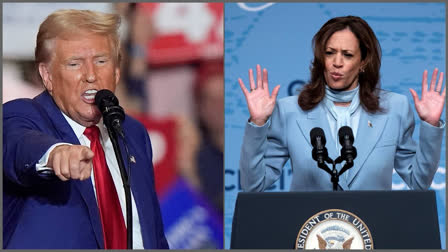Foreign policy often takes a backseat in national election campaigns, where domestic issues such as the economy, healthcare, and immigration tend to dominate the discussion. However, in the US, foreign policy decisions have a significant impact on internal dynamics, shaping both national security and economic well-being. The upcoming US presidential election between Kamala Harris and Donald Trump is no exception, as foreign policy has emerged as a pivotal issue influencing voter sentiment.
The recent debate between the two candidates highlighted several key foreign policy areas that are likely to shape the next administration's approach. From the ongoing Russia-Ukraine conflict to US-China relations, the candidates have expressed divergent views on how America should navigate its role in an increasingly volatile world. As the US remains a global leader with considerable influence, the foreign policy agenda of the next administration will have far-reaching implications for international stability, economic partnerships, and America's standing on the global stage.
Historically, American foreign policy has been centred on maintaining global dominance. This has often been pursued through unilateral actions and military intervention. However, the evolving global order has compelled the US to adopt a more multilateral approach, working alongside international partners to address pressing global issues. The world is facing a period of unprecedented challenges: the war in Ukraine, escalating tensions in the Middle East, the rise of cyber warfare, and the increasing influence of artificial intelligence in global security.
In this context, the foreign policy of the next US administration will be crucial in determining the trajectory of these conflicts and America's ability to maintain its leadership role. Critics argue that American foreign policy has often been self-serving, focused on preserving US interests above all. However, with globalisation being rolled back by rising protectionism, and the complexities of modern warfare evolving, the US must navigate these challenges carefully to avoid exacerbating global tensions.
Key debates
One of the most significant foreign policy issues raised during the Harris-Trump debate was the US withdrawal from Afghanistan, a contentious topic that continues to divide public opinion. Both candidates have had to address the long-term implications of the withdrawal, particularly in terms of America's credibility on the global stage and its ability to manage future security risks. Kamala Harris has emphasised the need for a measured, strategic approach to dealing with ongoing conflicts, while Trump remains focused on the economic aspects of foreign policy, particularly trade.
Trump's foreign policy agenda is heavily influenced by economic considerations. During his previous administration, Trump placed significant emphasis on renegotiating trade deals, particularly with China. His stance on tariffs is expected to play a key role in his foreign policy should he return to office. Trump has suggested imposing a 30 per cent tariff on Chinese imports, a move that would likely escalate trade tensions and potentially trigger retaliatory measures from China. This would have significant consequences for the US economy, as well as for countries like India that have a trade surplus with the US. Any blanket tariffs could lead to revenue losses for India and strain economic ties between the two nations.
Harris, on the other hand, has expressed a more balanced approach to trade, focusing on building alliances and strengthening economic partnerships. While she has not outlined a detailed economic plan, her administration is likely to take a more multilateral approach, seeking to avoid the protectionist policies favoured by Trump. This could lead to a more collaborative relationship with international partners, particularly in Asia, where economic growth and regional stability are key priorities. How that plays against China, remains to be seen.
Middle East
